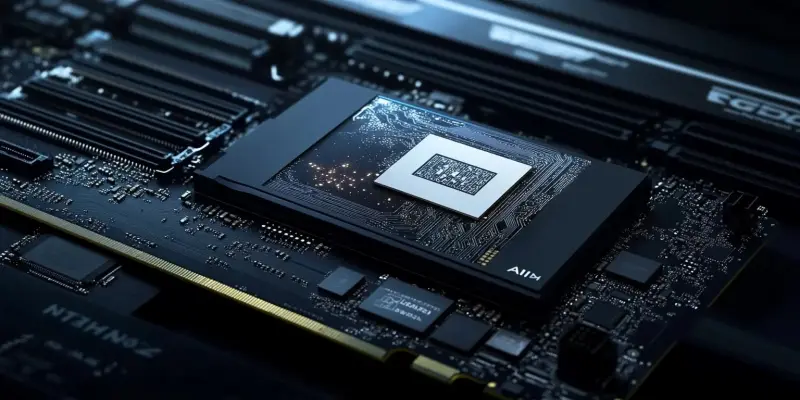Seagate has announced a significant advancement in hard disk drive (HDD) technology by introducing NVMe compatibility, signaling a move toward integrating magnetic storage with the speed and efficiency of PCIe protocols. This technological leap aims to address the growing demand for faster, cost-effective storage solutions, particularly in artificial intelligence (AI) training and inferencing within expansive and energy-intensive data centers. The integration of Non-Volatile Memory Express (NVMe) with HDD technology embodies a strategic response to these demands, marking a turning point in the pursuit of optimal data storage performance in AI workloads.
Advancements and Innovations
The core innovation involves adopting the PCIe-based NVMe protocol for HDDs, which eliminates the need for proprietary silicon used in traditional SAS/SATA interfaces, host bus adapters, and controller architectures. This shift is intended to facilitate higher throughput, lower latency, and reduced system complexity. While hard disk drives will still lag behind the raw performance of solid-state drives (SSDs), Seagate aims to optimize HDD efficiency for next-generation data centers. By integrating NVMe, Seagate seeks to capitalize on the protocol’s inherent benefits, drastically enhancing the efficacy of data storage architectures tailored to intensive AI processes.
A notable feature of these NVMe HDDs is the retention of the SAS/SATA connector to maintain backward compatibility while avoiding the use of host bus adapters (HBAs) or custom controllers. This integration simplifies AI storage solutions deployment and enhances the cooperative functionality of HDDs and SSDs through a unified NVMe software driver stack. The benefits of this seamless compatibility cannot be overstated, particularly in data environments where streamlined operations and cost-efficiency drive technology adoption.
Performance and Efficiency
Key benefits highlighted by Seagate include direct NVMe connections to GPUs, which circumvent traditionally CPU-centric data routes, thereby reducing potential bottlenecks and improving data processing efficiency in AI models. By facilitating more direct communication pathways, these NVMe HDDs reduce latency significantly, an essential factor in the rapid computation required for AI training and inference tasks. Moreover, the incorporation of NVMe over Fabrics (NVMe-oF) technology promises to enable fully distributed and scalable storage architectures, ideally suited to multi-rack storage clusters. This innovation stands poised to meet the horizontal scaling demands prevalent in modern data centers.
Seagate’s proof-of-concept tests involved custom NVMe HDDs, NVMe SSDs, Nvidia BlueField DPUs, and AIStore software, demonstrating favorable outcomes in AI workflows. Direct communication between GPUs and storage lent to reduced latencies and eliminated the overhead associated with legacy systems. Furthermore, the AIStore software optimized data caching, thereby enhancing AI model training performance. The real-world implications of these improvements were tangible, portraying a notable step forward in practical AI data center operations. NVMe-oF integration further underscored its potential in scaling storage clusters, a critical component in the continuously expanding AI data landscape.
Environmental and Economic Impacts
The implications of NVMe HDDs extend beyond just performance; they present notable environmental and economic benefits. Seagate projects a tenfold increase in embodied carbon efficiency per terabyte, quadrupled power efficiency, and substantially lower costs per terabyte compared to SSDs. These advancements are not only innovative but align with broader industry trends toward sustainable and cost-effective technological solutions. As data centers continue to grow, the need for greener, more efficient technology becomes increasingly pertinent.
Seagate is actively working to scale its HAMR-based Mozaic 3+ platform and increase HDD capacities, anticipating the future needs of AI-driven data centers. By continuing to explore and innovate within the NVMe storage solutions space with partners, Seagate solidifies its commitment to meeting both the current and emerging demands of vast data ecosystems. This focus on sustainability and economy positions NVMe HDDs as pivotal elements in the infrastructure of modern AI data centers.
Future Considerations
Seagate has unveiled a remarkable advancement in hard disk drive (HDD) technology by ensuring compatibility with NVMe, indicating a shift toward combining magnetic storage with the high-speed PCIe protocols. This innovation addresses the rising need for faster and more affordable storage options, especially in fields such as artificial intelligence (AI) training and inferencing, which involve vast and energy-consuming data centers. The convergence of Non-Volatile Memory Express (NVMe) with HDD technology represents a strategic response to these growing demands. This development signifies a pivotal moment in the quest for peak data storage performance in AI workloads, enabling a blend of speed, efficiency, and cost-effectiveness that current and future data centers require. This forward-thinking approach not only indicates technological progress but also aligns with broader trends towards optimizing storage solutions for increasingly complex and demanding AI-driven environments.

